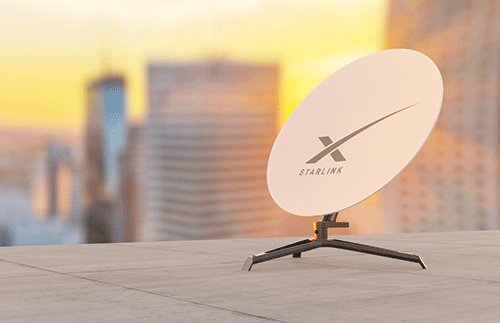After expressing interest to operate in Namibia, Elon Musk’s low earth orbiting satellite communication company Starlink has officially submitted its application to Namibian authorities.
Offering high-speed internet, many pundits believe Starlink’s entrance in the relatively small Namibian market could severely disrupt the status quo by increasing market competition.
“Yes, Starlink has submitted an application for licences to the authority. The application has been received, and is being processed and considered in terms of the provisions of the Communications Act (No.8 of 2009) and relevant regulations,” confirmed Emilia Nghikembua, chief executive officer of the Communications Regulatory Authority of Namibia (Cran).
Starlink, owned by Musk’s Space X, has become a popular option for a fast and reliable internet connection, particularly in rural areas where low population density makes it uneconomical for traditional communication companies. This is due to Starlink’s ever-growing fleet of low-orbit satellites, and the distance at which they orbit the earth. However, despite its speed and reliability, Starlink’s service cost is considered more expensive than traditional internet service providers.
However, the high cost does not seem to deter some users as some Namibians living in remote border areas where neighbouring countries already have Starlink, have asked whether they are permitted to make use of the service.
Responding to New Era queries, Nghikembua clarified that it is illegal for Namibians living along the border to use Starlink registered in neighbouring countries. This means Namibians in remote areas will have to await Cran’s decision on the Starlink application.
“Telecommunications' services offered within the borders of Namibia require a licence under the Communications Act,” she stated.
She added that to date, Cran has awarded a total of 69 telecommunications service licences in Namibia. “There are three pending licence applications for Class Comprehensive ECS & ECNS Telecommunications Service Licences,” Nghikembua clarified.
Undeterred by prohibitively high pricing, industry experts believe Starlink’s entrance into the local market would be good news for Namibian consumers.
“If Starlink is given a Namibian licence then our local players will have to improve their products. Major players like Telecom, MTC and Paratus will have to step up their act if they don’t want to give up their market share to the new player,” said one industry insider.
Meanwhile, Botswana granted Starlink an operating licence last month, three weeks after that government’s delegation met a SpaceX team in the United States. Botswana’s licensing came three months after the Botswana Communications and Regulatory Authority (Bocra), first rejected Starlink’s licence application due to what it called “missing information”. However, the decision was reversed after a meeting between SpaceX and president Mokgweetsi Masisi during the Africa-US Business Forum in Texas.
Starlink obtained a licence at the end of May this year to launch operations in Zimbabwe, albeit to a company owned by an alleged dubious individual.
“I’m pleased to announce that I have approved the licensing of Starlink by the Postal and Telecommunications Regulatory Authority of Zimbabwe to provide advanced Internet and related digital processing services in Zimbabwe through its sole and exclusive local partner, IMC Communications,” wrote Zimbabwean President, Emmerson Mnangagwa in a social media post.
Lasty year Sierra Leone granted Starlink an operational licence. That country emphasised that the Starlink approval marked a significant step in achieving universal connectivity across Sierra Leone.
Howevr, reports are that Starlink users in neighbouring South Africa faced a major setback as the satellite internet service provider’s services were terminated at the end of April this year due to “violation of terms and conditions”.
Despite this termination, Starlink’s roaming services still work in that country. This is because some customers use the service via resellers that buy Starlink roaming packages available in licenced countries. The resellers then register the services in those countries and manage subscriptions for users in South Africa.
Starlink itself stated in the recent email to users that ‘Mobile – Regional’ plans are meant for temporary travel and transit, not permanent use in a location. “Continuous use of these plans outside the country where service was ordered will result in service restriction,” Starlink stated.
Despite a potential to revolutionise internet connectivity, Starlink has been unable to obtain a licence to operate in South Africa from the Independent Communications Authority of South Africa (Icasa). This is because Icasa’s requirements mandate that any applicant must have 30% ownership from historically-disadvantaged groups to be considered for a licence.
-ebrandt@nepc.com.na


